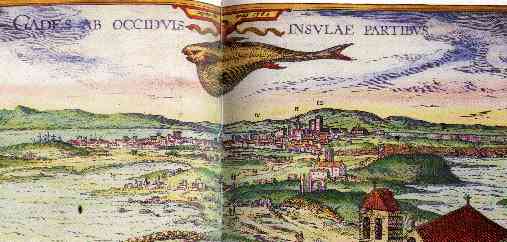
|
|
I can see him. He is standing on the top of the cliff, looking at the ocean; if we
raise our eyes, we see the foggy horizon confused with the sky that passes from gray to blue.
David de Cordova sees the ocean for the first time. He never imagined the existence of that immense blue. This is the sea! For some dark reason that could not be explained he thought he was near God.
In his native city, Cordoba, there is no sea; only the river,
mighty in spring, dry in the summerīs end. David remembers the
Guadalquivir and the old Roman Bridge. He remembers
the shallows, where he bathed with his friends; the fields where he took to graze the cows and goats of the family; the wheel
of the water mill of his parents, who sold it with urgency, by less than half
of its value, to Meir Melamed, who had been converted to Christianity
after he knew about the Edicto de Expulsion.
He tries to become familiar with the sea. They said to him
that Naples is by the sea. Tomorrow they start the journey to Naples, where
some relatives that he does not know are waiting for them.
I can see him, young, in his thirteen years, asking for his destiny. Which
will his luck be? What will happen to his people
threatened by the worse challenge after the exile to Babylon? The option
that posed the Kings is clear: conversion or exile.
He feels the wind of the sea on his face, and that salty
aroma. He aspires deep. The scent, new, formed of salt and foam, floods
his body with a breath of life. He remains still. The sun, that
falls over the horizon, blinds his eyes. He protects his vision with
his hands. The time stops...
This image is what impels me to write. What does David de Cordova feel when he watches the
sea? What does he feel when he knows that he must leave Spain with all
his family? What does he feel that last day on
his loved country, where he grew, and to which, perhaps, he will never be
able to return?
And I see him today, five hundred years later. And that
memory arrives to me, bequeathed by my grandparents, who came from the
Mediterranean, from an island surrounded by the sea. That sea whose warm air they felt in their faces with a scent of salt.
They felt pride of their Spanish origin, they felt love for the
language they spoke. They did not keep resentment. Those voices,
removed from history, arrive to me through the times, fossilized in the exile. Sweet voices, with intonations and idiom of a language that they
took through the world in their poor chests, that they conserved during
five hundred years like a valuable treasure, that is no longer spoken
and that they loved.
David, with much effort, turned his eyes from the
sea and slowly began to descend towards the port.
From the distance, he herd the sounds of the intense movement.
The galleys, moored to the wharves, received their heavy loads. He herd the
voices of the sailors, in a musical language, that he did not understand.
"Where were you, David? Thus
you live! Your father waits for you to help him with the
rammer."
"Yes mother, I was watching the sea."
"David, you do me a lot of bad blood! Hurry up! It is necessary to order our things. We leave
tomorrow at dawn."
David walked by the wharf. He saw four venecians galleys,
with the oars in rest and the sails folded. He walked through the
crowd that was busy preparing their things before boarding the
ships. They took everything they could: large chests filled
with clothes, small furniture, kitchen dishes,
goats and chicks. The families grouped themselves next to their
properties. The afternoon was warm. That night they would sleep out in the open.
He arrived next to his father, Solomon, who was occupied with the
rammer of the homesteads. Muchico, Davidīs older brother, and two
crew members helped him. They raised the heavy large chest that kept
books, the great treasure of the Cordova.
The sun begun to hide dyeing the horizon in red. The family met
to eat after a full day of anguishes. It was the last day in Spain,
the last day in that dear land. The first stars appeared. David ate
next to his parents and brothers. Before sleeping they recited the
night prayer. The silence gained the port of Cadiz. Nearby, a woman
sang:
" Give me your hand, my dove,
"Dame la mano, paloma
Cadiz, August the 2nd, 1492.
to raise me to your nest,
damned you sleep alone
and you donīt come to sleep with me..."
para subir a tu nido
maldicha que duerme sola
y no viene a dormir conmigo..."